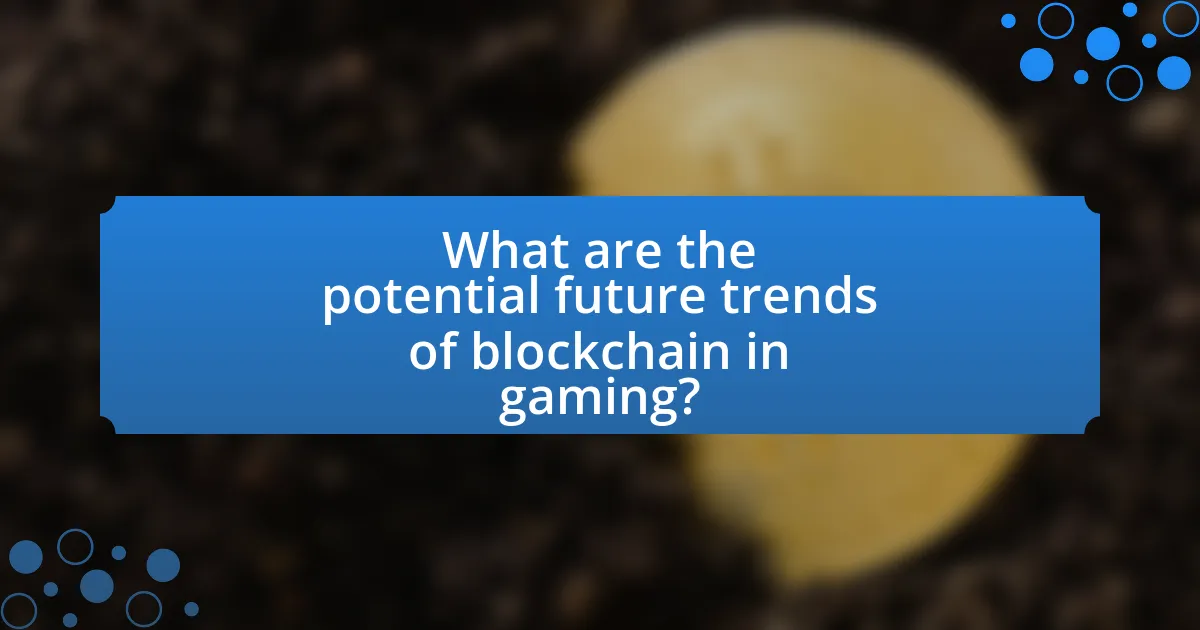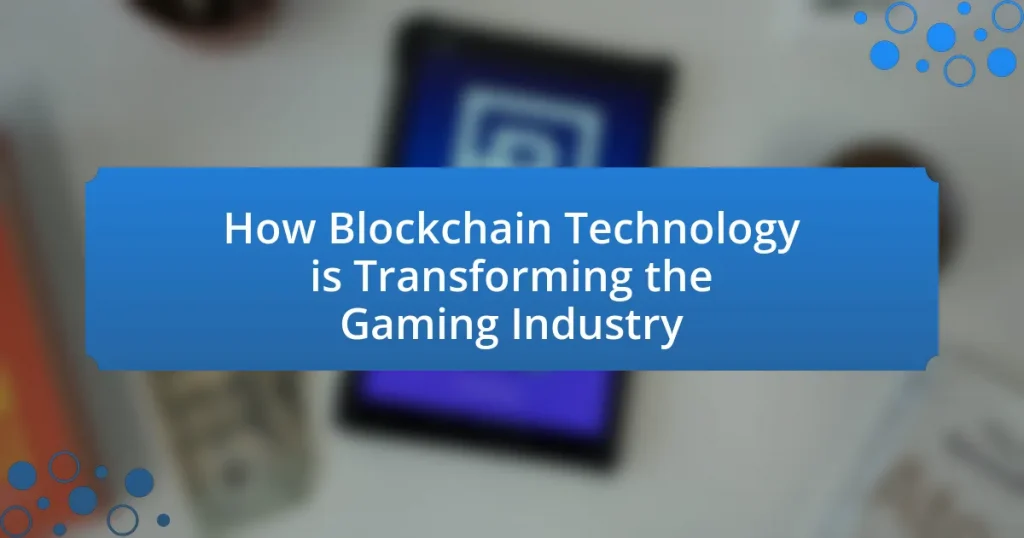Blockchain technology is fundamentally transforming the gaming industry by enabling true ownership of in-game assets, enhancing transaction transparency, and improving security. This article explores how decentralized platforms allow players to buy, sell, and trade digital assets securely, fostering player-driven economies exemplified by games like Axie Infinity and Decentraland. Key principles of blockchain, such as decentralization, transparency, and immutability, are discussed, along with the role of non-fungible tokens (NFTs) in reshaping game ownership and in-game economies. Additionally, the article addresses the challenges blockchain technology resolves in gaming, including fraud prevention and ownership verification, while highlighting future trends and best practices for integrating blockchain into gaming experiences.

How is Blockchain Technology Impacting the Gaming Industry?
Blockchain technology is significantly impacting the gaming industry by enabling true ownership of in-game assets and enhancing transparency in transactions. This technology allows players to buy, sell, and trade digital assets securely through decentralized platforms, ensuring that they have verifiable ownership of items such as skins, characters, and virtual real estate. For instance, games like Axie Infinity and Decentraland utilize blockchain to facilitate player-driven economies, where users can earn real money through gameplay. Furthermore, blockchain’s immutable ledger enhances trust among players by providing transparent records of transactions, reducing fraud and cheating. According to a report by DappRadar, the blockchain gaming sector saw a 2000% increase in unique active wallets in 2021, highlighting the growing adoption and impact of this technology in the gaming landscape.
What are the fundamental principles of blockchain technology?
The fundamental principles of blockchain technology are decentralization, transparency, immutability, and security. Decentralization ensures that no single entity controls the entire network, allowing for distributed consensus among participants. Transparency allows all transactions to be visible to network participants, fostering trust. Immutability guarantees that once data is recorded on the blockchain, it cannot be altered or deleted, ensuring the integrity of the information. Security is achieved through cryptographic techniques that protect data and transactions from unauthorized access and fraud. These principles collectively enable blockchain to function as a reliable and efficient system for various applications, including those in the gaming industry.
How does decentralization enhance gaming experiences?
Decentralization enhances gaming experiences by empowering players with true ownership of in-game assets and fostering a more equitable gaming environment. This shift allows players to buy, sell, and trade their assets freely on decentralized platforms, eliminating the control of centralized entities. For instance, blockchain technology enables the creation of non-fungible tokens (NFTs) that represent unique in-game items, ensuring that players have verifiable ownership and can monetize their investments. Additionally, decentralized gaming ecosystems promote community governance, where players can influence game development and policies, leading to a more engaged and invested player base. This model has been validated by successful decentralized games like Axie Infinity, which reported over 2 million daily active users, showcasing the demand for player-centric gaming experiences.
What role does transparency play in gaming transactions?
Transparency in gaming transactions ensures that players can verify the fairness and legitimacy of their interactions, fostering trust within the gaming ecosystem. This transparency is primarily facilitated by blockchain technology, which records all transactions on a public ledger that is immutable and accessible to all participants. For instance, in games utilizing blockchain, players can track the ownership and history of in-game assets, ensuring that items are not duplicated or fraudulently created. A study by the University of Cambridge highlights that transparency in transactions can reduce fraud by up to 50%, demonstrating its critical role in enhancing player confidence and engagement in the gaming industry.
Why is blockchain technology gaining traction in gaming?
Blockchain technology is gaining traction in gaming due to its ability to provide true ownership of in-game assets. This technology allows players to buy, sell, and trade digital items securely and transparently, which enhances the gaming experience and creates new economic opportunities. For instance, games like Axie Infinity have demonstrated that players can earn real income through gameplay, with the game’s economy generating over $1 billion in revenue in 2021. Additionally, blockchain’s decentralized nature reduces the risk of fraud and hacking, making it a more secure environment for gamers.
What challenges in the gaming industry does blockchain address?
Blockchain addresses several challenges in the gaming industry, including ownership, transparency, and fraud prevention. Traditional gaming models often limit players’ ownership of in-game assets, whereas blockchain enables true ownership through non-fungible tokens (NFTs), allowing players to buy, sell, and trade assets freely. Additionally, blockchain enhances transparency by providing a decentralized ledger that records all transactions, ensuring that players can verify the authenticity and scarcity of their assets. This transparency also helps combat fraud, as blockchain’s immutable nature makes it difficult for malicious actors to manipulate game data or assets. These features collectively improve player trust and engagement in gaming ecosystems.
How does blockchain improve security for gamers?
Blockchain improves security for gamers by providing a decentralized and immutable ledger that protects against fraud and hacking. This technology ensures that in-game assets, such as virtual currencies and items, are securely stored and verified through cryptographic methods, making it nearly impossible for unauthorized parties to alter or duplicate them. For instance, the use of smart contracts on blockchain platforms can automate and enforce game rules, reducing the risk of cheating and ensuring fair play. Additionally, blockchain’s transparency allows gamers to verify ownership and transaction history of their assets, further enhancing trust in the gaming ecosystem.

What are the key applications of blockchain in gaming?
The key applications of blockchain in gaming include asset ownership, decentralized marketplaces, and enhanced security. Blockchain technology enables players to truly own in-game assets as non-fungible tokens (NFTs), allowing for real ownership and transferability across different games. Decentralized marketplaces facilitate peer-to-peer trading of these assets without intermediaries, increasing liquidity and player engagement. Additionally, blockchain enhances security by providing transparent and immutable records of transactions, reducing fraud and cheating in games. These applications are supported by the growing adoption of blockchain platforms like Ethereum, which has seen a significant increase in NFT transactions, indicating a robust market for blockchain-based gaming.
How are non-fungible tokens (NFTs) changing game ownership?
Non-fungible tokens (NFTs) are revolutionizing game ownership by enabling players to have true ownership of in-game assets. Unlike traditional gaming models where assets are controlled by the game developers, NFTs allow players to buy, sell, and trade unique digital items on blockchain platforms, ensuring scarcity and provenance. For instance, in games like Axie Infinity, players can own, breed, and sell their Axies as NFTs, which has led to a new economy where players can earn real income from their gameplay. This shift not only empowers players but also creates new revenue streams for developers through secondary sales and royalties.
What benefits do NFTs provide to players and developers?
NFTs provide players and developers with ownership, monetization opportunities, and enhanced engagement. Players benefit from true ownership of in-game assets, allowing them to buy, sell, or trade items freely on secondary markets, which can lead to real-world financial gains. Developers gain new revenue streams through the sale of NFTs and can create unique, limited-edition content that enhances player engagement and loyalty. According to a report by NonFungible.com, the NFT gaming market reached over $4 billion in sales in 2021, demonstrating the significant economic impact and interest in this technology within the gaming industry.
How do NFTs influence in-game economies?
NFTs influence in-game economies by creating unique, tradable digital assets that enhance player ownership and engagement. This ownership allows players to buy, sell, and trade in-game items on secondary markets, which can lead to increased demand and value for these assets. For instance, a study by DappRadar in 2021 reported that NFT-based games generated over $4 billion in sales, demonstrating the significant economic impact of NFTs within gaming. Additionally, the introduction of NFTs can lead to new revenue streams for developers through transaction fees on trades, further integrating them into the economic framework of games.
What role does smart contract technology play in gaming?
Smart contract technology plays a crucial role in gaming by enabling decentralized and automated transactions within games. This technology allows for the creation of in-game assets that are verifiable and tradable on blockchain platforms, ensuring ownership and scarcity. For instance, games like Axie Infinity utilize smart contracts to manage the ownership of digital creatures, allowing players to buy, sell, and trade them securely. The transparency and immutability of smart contracts reduce fraud and enhance trust among players, as all transactions are recorded on the blockchain. Additionally, smart contracts facilitate the implementation of play-to-earn models, where players can earn real-world value through their in-game activities, further transforming the gaming landscape.
How do smart contracts automate transactions in games?
Smart contracts automate transactions in games by executing predefined rules and conditions on a blockchain, eliminating the need for intermediaries. These self-executing contracts facilitate in-game transactions, such as asset transfers or rewards, automatically when specific criteria are met, ensuring transparency and security. For instance, in games like Axie Infinity, smart contracts manage the buying, selling, and breeding of digital creatures, allowing players to engage in transactions seamlessly and trustlessly. This automation reduces the potential for fraud and enhances the efficiency of in-game economies, as transactions are recorded on an immutable ledger, providing a clear audit trail.
What are the implications of smart contracts for game developers?
Smart contracts significantly impact game developers by enabling automated, trustless transactions and ownership verification within games. This technology allows developers to create decentralized applications where in-game assets can be securely traded or owned by players without intermediaries. For instance, smart contracts facilitate the creation of unique, tradable digital assets, such as non-fungible tokens (NFTs), which can enhance player engagement and create new revenue streams. Additionally, smart contracts can automate royalty payments to developers whenever an asset is resold, ensuring ongoing revenue from secondary markets. The implementation of smart contracts also reduces fraud and enhances transparency, as all transactions are recorded on the blockchain, providing a verifiable history of ownership and transactions.

What are the potential future trends of blockchain in gaming?
The potential future trends of blockchain in gaming include increased player ownership of in-game assets, enhanced transparency in game mechanics, and the rise of decentralized gaming platforms. Player ownership is facilitated by non-fungible tokens (NFTs), allowing gamers to buy, sell, and trade unique items across different games, which is evidenced by the growing popularity of NFT marketplaces. Transparency is achieved through blockchain’s immutable ledger, which can verify game outcomes and transactions, reducing fraud and enhancing trust among players. Additionally, decentralized gaming platforms are emerging, enabling developers to create games without centralized control, as seen in projects like Axie Infinity, which has demonstrated significant user engagement and economic activity. These trends indicate a shift towards a more player-centric gaming ecosystem, driven by blockchain technology.
How might blockchain technology evolve in the gaming sector?
Blockchain technology is likely to evolve in the gaming sector by enhancing player ownership of in-game assets through non-fungible tokens (NFTs) and decentralized marketplaces. This evolution will enable players to buy, sell, and trade unique digital items securely, fostering a player-driven economy. For instance, the rise of games like Axie Infinity demonstrates how blockchain can facilitate real ownership, as players earn cryptocurrency through gameplay, which can be converted to real-world money. Additionally, blockchain’s transparency can improve game integrity by preventing cheating and ensuring fair play, as all transactions are recorded on an immutable ledger. This shift towards decentralization and player empowerment is supported by the increasing adoption of blockchain platforms in gaming, evidenced by a report from DappRadar indicating a 2000% increase in blockchain gaming users in 2021.
What innovations are on the horizon for blockchain gaming?
Innovations on the horizon for blockchain gaming include enhanced interoperability between different gaming platforms, allowing players to use assets across multiple games seamlessly. This is supported by the development of cross-chain technology, which enables assets to move freely between various blockchain networks. Additionally, advancements in decentralized finance (DeFi) integration within games are expected, providing players with opportunities to earn real-world value through in-game activities. The rise of play-to-earn models is also anticipated, where players can monetize their time and skills, as evidenced by the success of games like Axie Infinity, which generated over $1 billion in revenue in 2021. Furthermore, improvements in user experience through more intuitive interfaces and reduced transaction fees are being prioritized to attract a broader audience.
How could player engagement change with future blockchain developments?
Player engagement could significantly increase with future blockchain developments by enabling true ownership of in-game assets. This ownership allows players to trade, sell, or utilize their assets across different games, fostering a more interconnected gaming ecosystem. For instance, blockchain technology facilitates the creation of non-fungible tokens (NFTs), which can represent unique in-game items. A study by DappRadar in 2021 indicated that games utilizing blockchain technology saw a 200% increase in active users compared to traditional games, demonstrating the potential for enhanced player engagement through ownership and interoperability.
What are the best practices for integrating blockchain into games?
The best practices for integrating blockchain into games include ensuring transparency, enhancing player ownership, and maintaining scalability. Transparency is crucial as it builds trust among players by allowing them to verify game mechanics and transactions on the blockchain. Enhancing player ownership involves enabling players to truly own in-game assets, which can be achieved through non-fungible tokens (NFTs) that represent unique items. Maintaining scalability is essential to handle a large number of transactions without compromising performance, which can be addressed by utilizing layer-2 solutions or sidechains. These practices are supported by the increasing adoption of blockchain in gaming, with reports indicating that the blockchain gaming market is expected to grow significantly, reaching a valuation of over $50 billion by 2025.
How can developers ensure a seamless user experience with blockchain?
Developers can ensure a seamless user experience with blockchain by prioritizing user-friendly interfaces and minimizing transaction latency. By designing intuitive applications that abstract complex blockchain functionalities, developers can make it easier for users to interact with the technology. Additionally, implementing layer-2 solutions, such as state channels or sidechains, can significantly reduce transaction times and costs, enhancing the overall experience. For instance, games utilizing Ethereum’s layer-2 scaling solutions have reported transaction speeds that are up to 100 times faster than the main chain, allowing for smoother gameplay.
What considerations should be made for regulatory compliance in blockchain gaming?
Regulatory compliance in blockchain gaming requires adherence to laws governing financial transactions, data protection, and consumer rights. Blockchain games often involve cryptocurrencies and virtual assets, which may classify them as financial products, necessitating compliance with anti-money laundering (AML) and know your customer (KYC) regulations. Additionally, developers must ensure that their games comply with data privacy laws, such as the General Data Protection Regulation (GDPR) in Europe, which mandates the protection of user data. Furthermore, consumer protection laws must be considered to safeguard players from unfair practices, ensuring transparency in transactions and clear communication regarding in-game purchases. These considerations are critical as regulatory bodies globally are increasingly scrutinizing blockchain applications in gaming, with some jurisdictions already implementing specific regulations for this sector.


